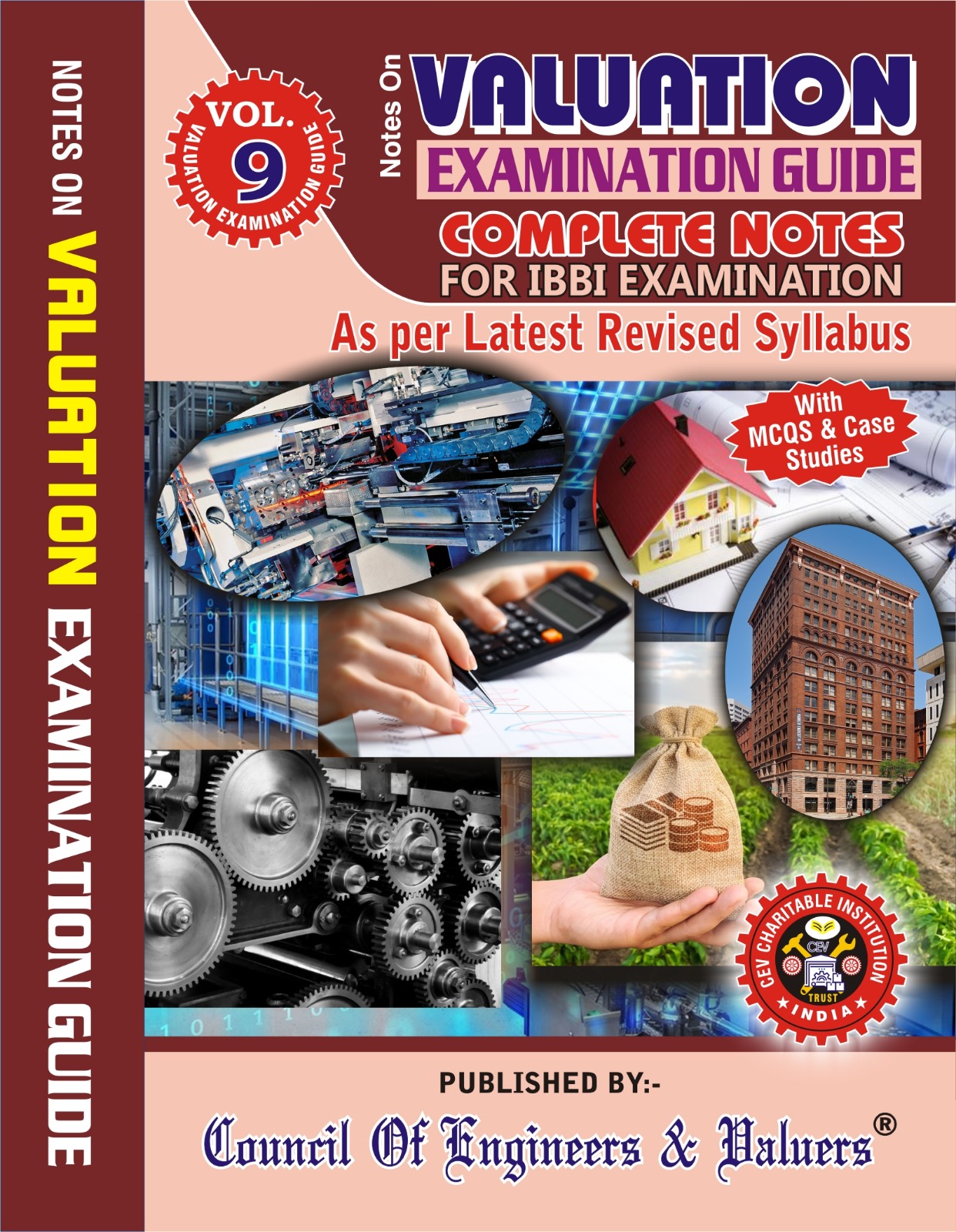Duties of Property Valuers in India
A Detailed Analysis
Property valuers in India play a pivotal role in the real estate and financial sectors. Their work has a significant impact on property transactions, tax assessments, insurance claims, mortgage approvals, and legal matters. The duties and responsibilities of property valuers are governed by various laws, regulations, and professional standards to ensure accuracy, transparency, and fairness in property valuation. This analysis explores the key duties of property valuers in India, highlighting the role of the Council of Engineers & Valuers (CEV) and the CEV Integral Appraisers Foundation RVO in upholding high standards in the profession.
1. Conducting Property Valuations
The primary duty of a property valuer is to conduct accurate, unbiased, and reliable valuations of immovable properties. These properties may include residential, commercial, industrial, and agricultural land. Valuations are typically required for:
- Sales and Purchases: Estimating the market value of properties for transactions.
- Mortgages and Loans: Providing independent valuations to support property financing.
- Taxation: Assisting in determining the value of property for property tax assessments or wealth tax purposes.
- Insurance: Estimating the replacement value for property insurance.
- Legal Proceedings: Providing expert valuations in disputes, inheritance matters, and other legal contexts.
The valuation must reflect the current market conditions, the physical condition of the property, and any legal or regulatory considerations that might affect its value.
2. Adherence to Professional Standards
Property valuers must follow strict professional standards and guidelines to ensure the credibility and consistency of their work. In India, the Council of Engineers & Valuers (CEV) plays a key role in setting these standards. The CEV is responsible for:
- Establishing Codes of Ethics: The CEV requires valuers to adhere to ethical guidelines emphasizing impartiality, confidentiality, and objectivity.
- Valuation Methods: Valuers must apply internationally recognized valuation methodologies such as the Sales Comparison Approach, Income Approach, and Cost Approach, depending on the type of property being valued.
- Continuing Education: The CEV mandates that valuers participate in ongoing professional development to stay updated with market trends, regulatory changes, and best practices.
These standards ensure that property valuations are performed with integrity and professionalism, contributing to a trustworthy valuation system.
3. Legal and Regulatory Compliance
Property valuers in India must comply with a variety of legal and regulatory frameworks. The CEV Integral Appraisers Foundation RVO (Recognized Valuers Organization) ensures that valuers adhere to these laws and maintain their registration and certifications. Key legislations and regulatory bodies include:
- Wealth Tax Act, 1957: Registered valuers are required under this Act for the valuation of properties for wealth tax assessments.
- The Real Estate (Regulation and Development) Act, 2016 (RERA): Valuers are sometimes required to provide valuations as part of the RERA framework, which applies to developers and real estate projects.
- Income Tax Act, 1961: The Income Tax Department engages property valuers to assess capital gains, inheritance, and certain tax-related matters.
- The Registration Act, 1908: Valuers may be needed to assess properties for stamp duty or property transfer processes.
- SARFAESI Act, 2002: Valuers are involved in valuing assets seized by banks under this Act, particularly in cases of non-performing loans.
The CEV Integral Appraisers Foundation RVO plays a crucial role in ensuring that valuers comply with these regulations and uphold their professional certifications.
4. Independence and Impartiality
A fundamental duty of a property valuer is to provide an independent and unbiased opinion of value. Valuers must avoid conflicts of interest and ensure that their valuations are not influenced by any external pressure, whether from clients, developers, or other parties with a vested interest in the outcome.
The CEV upholds this principle by establishing clear guidelines for valuers to follow, ensuring that:
- Valuers avoid situations where they might have a personal or financial interest in the property being valued (e.g., valuing properties owned by close relatives or business associates).
- They do not provide inflated or deflated valuations to suit the needs of clients or financial institutions.
- They adhere strictly to professional codes of conduct that emphasize objectivity and integrity.
5. Reporting and Documentation
Once a property valuation is completed, valuers are required to document their findings and produce a valuation report. The report must include:
- Methodology: The methods used to arrive at the valuation, such as the market approach, income approach, or cost approach.
- Assumptions: Any assumptions made during the valuation process, such as current market trends, the condition of the property, or legal considerations.
- Limitations: The scope and limitations of the valuation (e.g., physical inspection limitations, legal issues affecting valuation).
- Supporting Evidence: Documentation supporting the valuation, such as comparable property sales data, income reports, and market analysis.
This report must be comprehensive, clear, and well-structured. The CEV Integral Appraisers Foundation RVO ensures that valuers produce reports that meet these rigorous standards, which are crucial in legal disputes or other proceedings.
6. Inspection and Due Diligence
Before conducting a property valuation, a valuer is obligated to carry out a physical inspection of the property. This inspection typically involves assessing:
- Condition of the Property: Structural integrity, aesthetic appeal, visible damages or alterations, and general maintenance.
- Location and Surroundings: The impact of the neighborhood’s infrastructure, accessibility, and amenities on the property’s marketability and value.
- Title and Legal Status: Ensuring that the property title is clear and that no legal disputes or encumbrances exist.
Valuers must also exercise due diligence by verifying ownership documents, tax records, and compliance with local regulations such as zoning laws, building codes, and environmental regulations. The CEV emphasizes the importance of thorough due diligence to ensure accurate valuations.
7. Role in Legal Disputes and Court Proceedings
Valuers are often called upon as expert witnesses in legal matters involving property disputes, inheritance, divorce settlements, and property tax assessments. In such cases, the property valuer is required to:
- Provide an independent valuation based on market data and legal requirements.
- Testify in court to defend their valuation methodology and conclusions.
- Assist in resolving disputes regarding the value of assets, particularly in corporate mergers, acquisitions, or restructurings.
The CEV Integral Appraisers Foundation RVO ensures that valuers maintain their professional competence, allowing them to perform effectively in legal settings and provide objective testimony.
8. Role in Development and Investment Projects
Property valuers also play a crucial role in real estate development and investment projects. Their duties include:
- Feasibility Studies: Assessing the viability of a development project based on market conditions, projected returns, and land value.
- Investment Appraisals: Valuing properties for potential investors or developers to assess return on investment (ROI) and associated risks.
- Due Diligence: Conducting valuations as part of the due diligence process when acquiring land or properties for development.
The CEV Integral Appraisers Foundation RVO ensures that valuers adhere to best practices during the valuation process for development and investment projects, helping stakeholders make informed decisions.
Property valuers in India carry out a range of vital duties that require technical expertise, ethical standards, and a deep understanding of legal, economic, and market factors. They are integral to the functioning of the real estate sector, financial institutions, legal systems, and the broader economy.
The Council of Engineers & Valuers (CEV) and the CEV Integral Appraisers Foundation RVO play a central role in ensuring that valuers maintain their professional certifications, comply with regulatory standards, and uphold the integrity of the valuation process. As the industry evolves, valuers must continue to update their knowledge and practices to stay ahead of market trends and regulatory changes.
Adhering to high professional standards, maintaining independence, and ensuring impartiality are central to the role of property valuers in ensuring accurate, transparent, and fair property valuations. The efforts of organizations like the CEV and CEV Integral Appraisers Foundation RVO are essential in shaping a trustworthy and reliable property valuation system in India.



